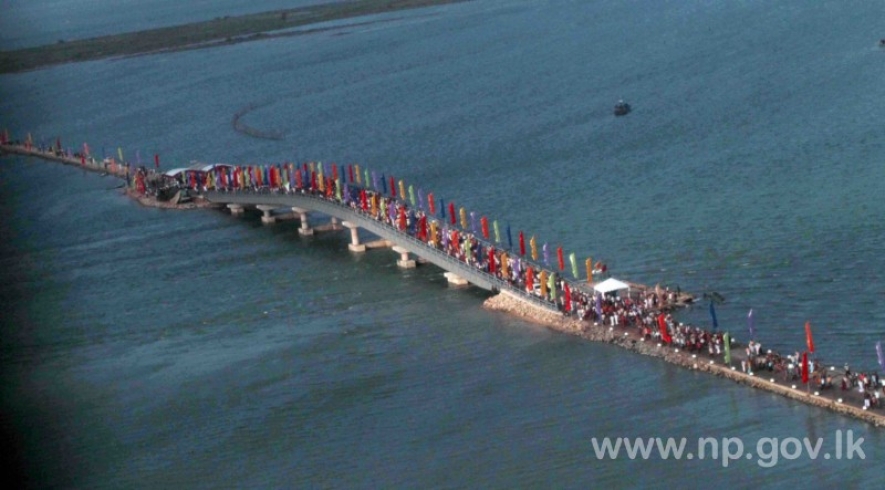A journalist who had visited the North recently wrote that the unwavering leadership of His Excellency the President and the unified efforts of all the Forces, which were well coordinated by a determined Defence Secretary, with the support of the entire peace loving population of the country, opened the door to a newer and mostly unfamiliar peaceful environment. Today, Jaffna is reawakening with a massive development drive which has contributed largely to boost the Jaffna economy enabling the people who were displaced as a result of brutal LTTE terrorism for nearly three decades to recommence their normal livelihood in a peaceful and free environment.
In an interview with news.lk, Governor of the Northern Province Maj Gen (Retd) G.A. Chandrasiri shares his views and experiences of rebuilding Jaffna from scratch to its present form and explains his future plans to develop the Northern Province.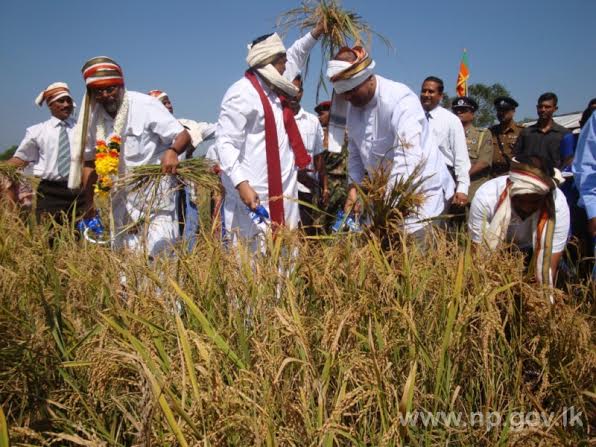 Two projects, Major Jaffna Peninsula Water Supply Scheme and Municipal Council Sewerage Disposal Scheme launched with an estimated cost of Rs 24,725 million. Under developing irrigation sector, 30 major and medium irrigation schemes have been rehabilitated. One drainage scheme and 38 salt-water exclusion schemes, 601 minor irrigation schemes and 537 small ponds rehabilitated. Two lagoon rehabilitation projects completed and initiatives have been taken to commence work on two Dam Safety programmes.
Two projects, Major Jaffna Peninsula Water Supply Scheme and Municipal Council Sewerage Disposal Scheme launched with an estimated cost of Rs 24,725 million. Under developing irrigation sector, 30 major and medium irrigation schemes have been rehabilitated. One drainage scheme and 38 salt-water exclusion schemes, 601 minor irrigation schemes and 537 small ponds rehabilitated. Two lagoon rehabilitation projects completed and initiatives have been taken to commence work on two Dam Safety programmes.
In restoring electricity, the ADB and Japan International Cooperation Agency provided Rs 6,759 million to restore power supply from Vavuniya to Jaffna transmission line and two grid stations at Kilinochchi and Chunnakam. Northern Spring project spent Rs 5,297 million while transmission and augmentation of Vavuniya Grid Substation cost Rs 7,024 million.
To develop the fisheries sector, 8,912 boats, 101,006 fishing equipment were distributed among 31,122 fishing families to restore their livelihood. As a result the sea-food productions had increased upto 48,500 MT in 2012, and daily catch in the five districts of the province increased upto 94,933 kilos. A Regional College of Fisheries and Nautical Engineering was established in Jaffna and Sea Cucumber Cultivation Pilot project commenced at Navanthurai.
With regard to developing livestock industry, the government invested Rs 373.39 million to help people with equipment, tools and machinery, and distributed 4,687 hybrid cattle, 5,406 goats and 423,017 chicks. We set up 42 dairy villages, 52 cattle breeder farms, 38 milk sales outlets and chilling tanks. Now the family income of those engages in livestock industry has increased from Rs 48,000 per annum in 2008 to Rs 120,000 per annum, milk production which was 18,750 kg per day increased upto 52,411 kg, meat production from 15,630 kg to 28,423 and egg production from 120,000 kg to 230,000 kg.
Under the Divi Neguma National Programme of creating poverty free Sri Lanka the government targeted setting up one million home economical units in the Northern Province where the target sectors were agriculture, fishing, livestock development, milk production, cultivation of additional food crops, promoting self-employment and horticulture. This project was inaugurated in Jaffna on May 13, 2011 and in the first stage the number of benefited families increased to 6,000. As at today’s records, 190,000 families of the NP involved in Divi Neguma Projects and the government agencies had distributed 224, 800 seed packets, 99,680 coconut saplings, 5,000 vegetable plants, 21,705 fruit plants, 25,000 cashew nut plants and 4,000 chicks. Seven private nurserymen in Jaffna district produced 100,000 Moringa seedlings.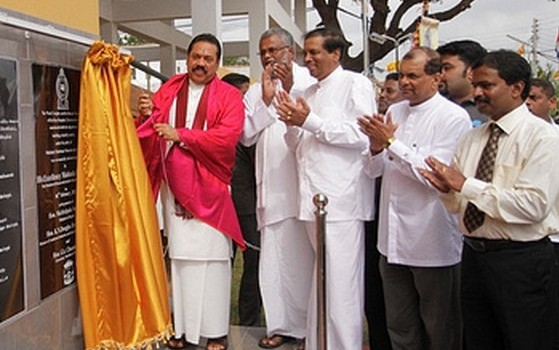 The government had spent Rs 5,828.77 million to develop health sector in the NP and 237 major health institutions and quarters for health staff were reconstructed and renovated. Medical equipment worth around Rs 1,300 million provided to the hospitals and Rs 500 million worth ambulances, single cabs, mobile dental vehicles, mobile spraying units, a mental health vehicle and other vehicles provided. Effective measures had been taken to control dengue outbreak in the province. President Mahinda Rajapaksa declared open Multi-facility buildings complex at the Jaffna Teaching Hospital. The building complex constructed at the cost of Rs 2,600 million housed 10 operation theaters, two Intensive Care Units with 20 beds, a central supply and sterilization unit, a central laboratory, a disease analyzing unit and all sophisticated medical equipment.
The government had spent Rs 5,828.77 million to develop health sector in the NP and 237 major health institutions and quarters for health staff were reconstructed and renovated. Medical equipment worth around Rs 1,300 million provided to the hospitals and Rs 500 million worth ambulances, single cabs, mobile dental vehicles, mobile spraying units, a mental health vehicle and other vehicles provided. Effective measures had been taken to control dengue outbreak in the province. President Mahinda Rajapaksa declared open Multi-facility buildings complex at the Jaffna Teaching Hospital. The building complex constructed at the cost of Rs 2,600 million housed 10 operation theaters, two Intensive Care Units with 20 beds, a central supply and sterilization unit, a central laboratory, a disease analyzing unit and all sophisticated medical equipment.
Restoration of civil administration and services had been completed. The total area of the Northern Province is 8.847.98 sq.km and the population is 1.2 million. There are 34 Divisional Secretariat Divisions, 34 local authorities in the five districts. Despite the problems and difficulties, all these offices continued work. Civil servants re-started and reported to work in their original locations and action was taken to reconstruct or to build newly the offices in their original locations.
These are only economical, administrative and political aspects. There were programmes and projects the government conducted for the social and psychological well-being of the people. Maj Gen Chandrasiri commenced a tri-lingual training centre based on the concept of His Excellency the President that all should be proficient in all three languages. The trilingual training centre was declared open in 2012 by His Excellency former President of India Dr A.P.J. Abdul Kalam. “Today there are over 2,500 students learning languages in that centre. The progress we have shown had inspired many private sector organizations to commence similar programmes in the NP. We had debate championships in all three languages. We had many other social integration programmes such as traditional drama festival, traditional kites festival, a chess championship etc. We also built a Children Park in Jaffna town which is visited by around 100 families per day. My next objective is to have a mini-zoo and a properly equipped basketball, netball and volleyball courts at Old Park in Jaffna. We have renovated and reconstructed kovils, mosques, churches and temples,” the Northern Province Governor said.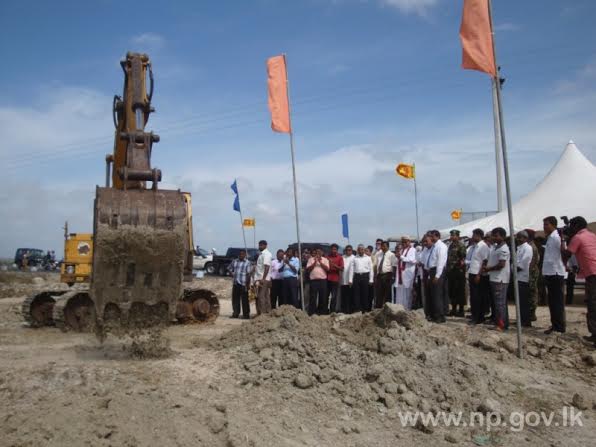 Asked to explain the role of the governor in those projects and programmes, he said that the governor had to monitor properly the spending of money in those development projects. Maj Gen Chandrasiri used to go to every district and summon all the officials once a week and went one be one to check whether these things have been done properly. “When the work was not proper or lacking I had taken action. For example, I had removed about 50 contractors whenever I found they were not doing the job expected from them. They were sacked for doing wrong things and for not doing their job properly. But none of them complained against me because they had been convinced that the fault was on their hands. Further they could not go behind anyone and exert pressure on me to take them back. These stern actions were necessary to get the job done in some cases. To do a straight forward job the man at the helm, the governor in the case of the Northern Province, has to be 100 percent genuine and honourable. That was how we did our work for the past five years and that is why the people respect us. All the secretaries, provincial directors of the provincial council were very honest persons and they did a commendable job. It was my job to check their work,” he said.
Asked to explain the role of the governor in those projects and programmes, he said that the governor had to monitor properly the spending of money in those development projects. Maj Gen Chandrasiri used to go to every district and summon all the officials once a week and went one be one to check whether these things have been done properly. “When the work was not proper or lacking I had taken action. For example, I had removed about 50 contractors whenever I found they were not doing the job expected from them. They were sacked for doing wrong things and for not doing their job properly. But none of them complained against me because they had been convinced that the fault was on their hands. Further they could not go behind anyone and exert pressure on me to take them back. These stern actions were necessary to get the job done in some cases. To do a straight forward job the man at the helm, the governor in the case of the Northern Province, has to be 100 percent genuine and honourable. That was how we did our work for the past five years and that is why the people respect us. All the secretaries, provincial directors of the provincial council were very honest persons and they did a commendable job. It was my job to check their work,” he said.
“To do that you cannot stay in Colombo and remote control the work there. What I believed since my early days that you have to be physically there to manage the work. I personally visit all the places and projects and inspect them. You may not believe that as the governor, at the initial stages I travelled 300-400 km per day – to launch something, to allocate money to inspect work or to check progress. We start from Colombo we go to Vavuniya, Mulaithivu and Jaffna. On certain days I started from Jaffna, Mannar and come to Vavuniya and stayed in Vavuniya, again the following day from Vavuniya, Mulithivu to Jaffna. Sometimes I stayed in army camps when everything was disarray at that time as there is no place to stay. These travelling had a heavy toll on my health. After three years of heavy work, I got a heart problem and doctors who checked me said there was lot of phlegm in my system due to the dust. That was the condition of roads then. It took 12 hours from Colombo to Jaffna then, today it is only six hour journey,” the governor said.
Describing the situation in the Northern Province after local government and provincial council elections, the governor said that in the provincial council system there were two main categories –the provincial council and pradeshiya sabahas. As it had been already mentioned there are 34 Pradeshiya Sabhas within the five districts of the Northern Province. These Pradeshiya Sabhas need political authority to function. In 2011 local government elections were held to elect 328 members for the 34 Pradeshiya Sabhas. The government has given them more than 1,000 million rupees to spend on development projects under the Pura Neguma Programme. In this programme, each Pradeshiya Sabha is empowered to make decisions on how they should spend the money allotted to them. The Pradeshiya sabhas in the Northern Province are functioning smoothly indicating that democracy is thriving.
The next stage of political administration in a province is the provincial council, which the Northern Province did not have then. “His Excellency the president gave directions and instructions that we should hold elections on September 21, 2013. Accordingly we had elections and everybody knows what the results were. As per the results the Northern Provincial Council first met on October 25, 2013.”
“Since 2012, we started work to accommodate the Northern Provincial Council in the administrative structure of the Northern Province. A provincial council is a mini-parliament. There needed a proper building for the council to meet. At that time there was no building with facilities for a Provincial Council to function so we started building one. When we consulted the government it allocated Rs 100 million for the purpose. The council was constructed at Kaithadi in Jaffna purely under my directives. I used to go there personally to check the progress of the building once a month. And finally once it is ready I gave them one of my own national flags which I kept in my office to be kept in the provincial council.”
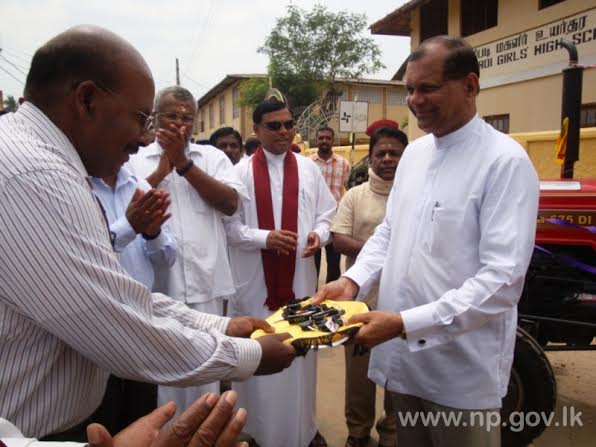
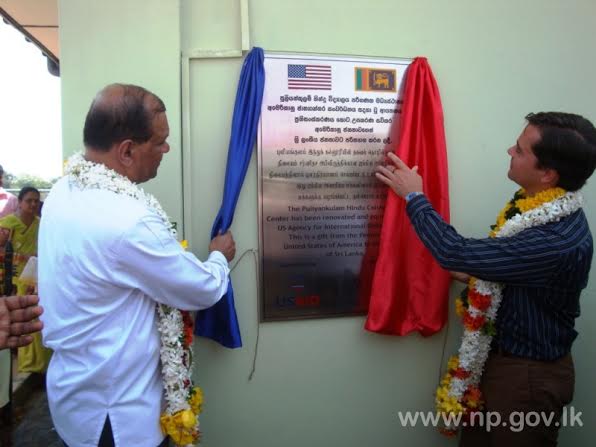
Distribution of 4-wheel tractors to Palmyra Development on 25 February 2011 ICT Center at Pulliyankulam Hindu College Opened on 09 March 2011
The governor said that the Northern Provincial Council had been allocated Rs 1.2 billion for this year. Those who run the council have to spend these monies for the benefit of people. So far they have spent one third of that money. They have to work fast and make sure that the money allocated for the people be utilized.
Asked to comment on the media reports on an imbroglio between him and Northern Province Chief Minister, a smiling governor said that there was no such imbroglio. “On the very first day, honourable Chief Minister and I both went there and declared open the Northern Provincial Council. Instead of taking his oath before me the Chief Minister said he would prefer to do so before President Mahinda Rajapaksa. So on October 7, 2013, the Chief Minister was sworn in before the President with I am at the side of the President. Now the Northern Provincial Council is functioning smoothly, today while I am talking to you the 16th session of the council is in progress.
“I as the governor am in charge of financial management of the Northern Province. The Chief Secretary of the Council engaged in the management of these finances on day-today basis. But the use of money is with the chief minister. It is my duty to check with secretaries and heads of departments coming under the Council to make sure the money has been spent properly. There are three specific ways how the money is coming to the Council. One is called Provincial Specific Development grant – the money directly coming for the development, then there is an allocation for the board of ministers and then funds for any other requirement including the maintenance and functioning of the Northern Provincial Council. The governor has to make sure that there would be no violation of financial regulations. It is the responsibility of the governor. I have been doing so.
“According to my thinking, there are various people saying various things. That is not my concern. I always go by the constitution and I always go by the Provincial Councils Act. When you are doing this type of work, you have to make sure that the chief secretary is the chief authority for the day-to-day finances of the province. Everything has to go through her. We have to make sure that she should be supported by all of us to see that the system functions properly. That is how we work at the moment,” the governor said.
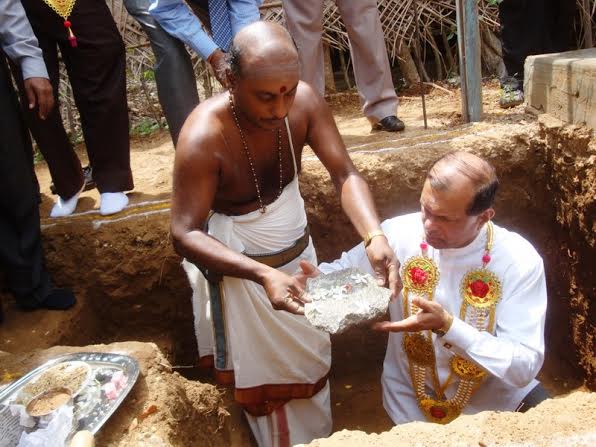
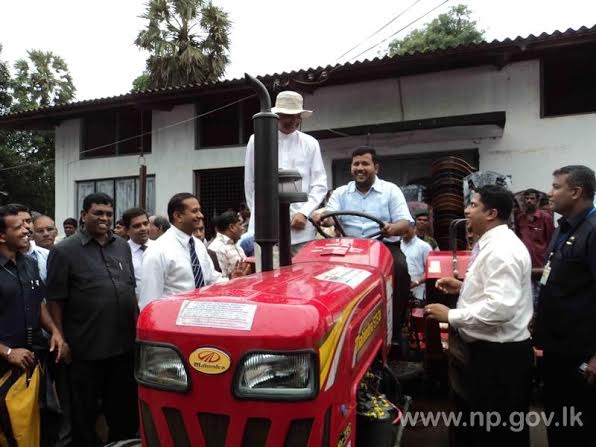
Laying foundation stone for a new building complex Government distributes 360 tractors to Wanni Districts
to Kilinochchi District Secretariat on March 11, 2012
Maj Gen Chandrasiri as the governor of the Northern Province meets all foreign dignitaries ranging from heads of states to officials from international organizations. Commenting on foreign leaders coming to Sri Lanka visiting specially the North, he said that the Northern Province had always been a centre of gravity. So everybody visiting Sri Lanka has their focus on the Northern Province. “It has to be understood. I made it to a point to give these visitors the true picture of the Northern Province,” he said.
Asked for his assessment how far the country had come in the direction towards reconciliation, the governor said that the nation is gradually advancing as per the government programme. “We have our own indigenous methods of doing everything - whether it comes to resettlement or demining or political development or infrastructure development or anything we have our own system under the Mahinda Chinthana, and so in the case of achieving reconciliation. Currently we provide the people who lost owing to war with chances of leading a better life. Finally what matters is whether you have been able to help them stand on their own feet economically. With the assistance of all we have been able to help the people in the North to regain their lives and their future is set. So the government’s reconciliation programme is gradually moving ahead. Nobody could expect, or nowhere in the world has this much been achieved in four years time.”
Responding to the request to comment on the demand by some people that he be replaced with a person of civilian background, the retired Maj Gen said: “Some may say that the governor is a military man. That is immaterial. I retired five years ago and now am a civilian. Of course military training was my foundation. I am proud of my military achievements. I would not have become the governor in first place if I did not have what I achieved as a military person. I was appointed a governor because what I had done in the army. That was why His Excellency the President gave me this position. I will do my best as per the instructions I receive from the President.”
Asked for his opinion whether it could have been possible for a person with civilian background achieve what he has been able to achieve as the governor, he said it was not that easy. “It is not that easy for a civilian. What you have to understand is Northern Province Governor’s job is not only a constitutional job. The Northern Province is a challenging province always. First, whoever who goes there whether a military commander or political leader you have to do hard work. Unless you do not know the situation on ground or you do not have a better knowledge of the terrain and geography, you cannot succeed. Unless you understand the psyche of the people, unless people accept you as a better person to do the job, you cannot do the job there. Second, when you are working, you have to be hundred percent genuine of what you are doing. If you do something your own benefit, people would know that so well. Being a person who served there on and off for years, I knew how people think. Geographically I know the Northern Province more than anyone else. It was a big advantage for me. When I started working on development projects it was very easy for me as I knew most of the people by their names. Since they knew me they supported me. I think it was a big advantage as a military person who knows the subject to do that with that commitment. You need to have commitment to do the job. Third is that you have to live there. You cannot live in Colombo and work in the Northern Province. Those are my theories that worked for me during my years in the army. That military background remained an additional strength to me to carry out the civil administration duties for the betterment of society and people of Northern Province under the guidance of His Excellency the President Mahinda Rajapaksa,” he said.
Describing his feelings of so much of achievements after five years of rigorous work, the governor said that 350,000 people fleeing from the LTTE held areas had nothing at the beginning of this process. “They had to start from zero. That is where we started. I am not telling you we have achieved 100 percent mark but am sure that we have achieved more than 85 percent. From zero to 85 percent in five years is an achievement. The government did its national duty. And today you do not find anyone at roads or at your door step coming with a bowl and begging in the Northern Province. You do not find beggars in the Northern Province, not a single beggar. We have given these people their livelihoods, restored peace and democracy. I am very proud to say I am one of the pioneers who had involved in this. I do not care of what certain politicians say. They need to incite people and they cannot do so if we work and help those people to stand on their feet. These politicians are afraid that we develop the Northern Province. They for their political survival need the people stay in misery and deprived so that they could muster votes. They need to raise issues, create disharmony to fetch votes. I have no time for them but to spend my time to carry out the task assigned to me by the President and do it to the letter,” the governor said.
Maj Gen Chandrasiri spoke so high of the resumption of Yal Devi railway to Jaffna after 25 years and was hopeful that it would help rebuild harmony. “It is not mere a railway service providing transport. It is the link between the North and South, the bond between people of the South and the people of the North. It is this bond we want to nurture to further the relations between people. That was why President Mahinda Rajapaksa went in the first train to Jaffna. The train service will help people in the Northern Province socially, economically and emotionally. The price of a ticket from Colombo to Jaffna is Rs 380 and six trains ply from Colombo to Jaffna and vice versa daily. The value of the train service would be felt more and more in the times to come. We are planning to set up an economic centre in Kilinochchi which is to be declared open by Minister of Economic Development Hon Basil Rajapaksa soon. Products of North would soon be coming to the markets of Colombo and the prices of most of the essential items would go down drastically. It would help Northern Province farmers and industries economically. The train service will help people of both North and South while binding them together more and more,” the governor said.
Asked of his family, Governor Chandrasiri said: I am married and have three daughters. I have a grandson and two granddaughters, they live abroad. I had very little time for my family as my time had been consumed by work which I do happily. I am totally committed to the work given to me and I carry it out to the best of my ability as the governor of the Northern Province.”
- Special Reporter

